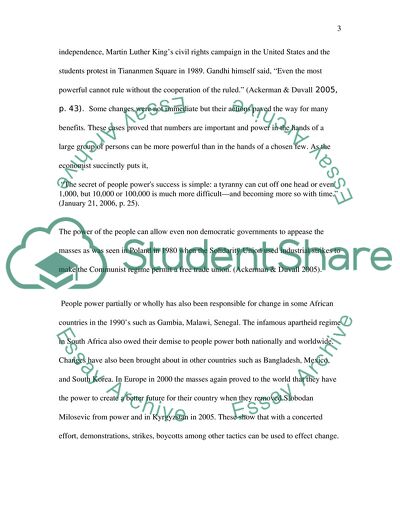
- Home
- Free Samples
- Premium Essays
- Editing Services
- Extra Tools
- Essay Writing Help
- About Us
- Studentshare
- Subjects
- Miscellaneous
- (argumentative) the power of the peole is stronger than government in creating a better future.do you agree
(argumentative) the power of the peole is stronger than government in creating a better future.do you agree - Essay Example
The power of the government can also be viewed as transferred power from…

- Subject: Miscellaneous
- Type: Essay
- Level: Masters
- Pages: 4 (1000 words)
- Downloads: 0
- Author: altaberge
Extract of sample "(argumentative) the power of the peole is stronger than government in creating a better future.do you agree"
Numerous revolutions and coups d’etat have been spearheaded by the common man and in many instances led to a better way of life for a whole nation or group of peoples. The abolition of slavery in the western hemisphere occurred partially because the slaves were willing and ready to sacrifice their lives and the little they had in exchange for their freedom and independence. Even before that era many revolutions such as the French Revolution were successful because the will of the people was the main focus.
The power of the people has also effected change using non violent means. Some of the more successful changes were Gandhi and his followers who brought about India’s independence, Martin Luther King’s civil rights campaign in the United States and the students protest in Tiananmen Square in 1989. Gandhi himself said, “Even the most powerful cannot rule without the cooperation of the ruled.” (Ackerman & Duvall 2005, p. 43). Some changes were not immediate but their actions paved the way for many benefits.
These cases proved that numbers are important and power in the hands of a large group of persons can be more powerful than in the hands of a chosen few. As the economist succinctly puts it, “The secret of people powers success is simple: a tyranny can cut off one head or even 1,000, but 10,000 or 100,000 is much more difficult—and becoming more so with time.” (January 21, 2006, p. 25). The power of the people can allow even non democratic governments to appease the masses as was seen in Poland in 1980 when the Solidarity Union used industrial strikes to make the Communist regime permit a free trade union.
(Ackerman & Duvall 2005). People power partially or wholly has also been responsible for change in some African countries in the 1990’s such as Gambia, Malawi, Senegal. The infamous apartheid
...Download file to see next pages Read MoreCHECK THESE SAMPLES OF (argumentative) the power of the peole is stronger than government in creating a better future.do you agree
Global War on Terrorism
The Rhetorical Tradition Issues
Customer Service
Analysis of the 2008 Presidential Debates
United States Uniform Personnel Identification System
Online Learning for Deaf Students, a Deaf Perspective
Quality Customer Service
Political Debates: A Struggle for Dominance

- TERMS & CONDITIONS
- PRIVACY POLICY
- COOKIES POLICY